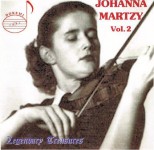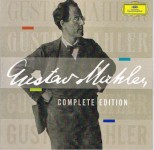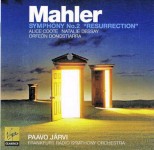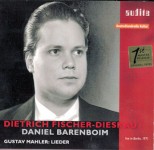OLD WINE IN NEW BOTTLES – Fine Old Recording Re-released - July 2010
OLD WINE IN NEW BOTTLES – Fine Old Recording Re-released
By Bruce Surtees Hungarian violinist Johanna Martzy (1924-1979) had a unique, pure and tender, quasi angelic tone. Now an icon and cult figure and even though she recorded for major labels including EMI and DG, her records are in such demand that it is not unusual that her LPs at ‘second hand’ specialists are priced in the thousands of dollars. In the last 20-30 years there have been extensive efforts to locate her live broadcasts and each such find is welcomed as a treasure by collectors. One British label was for many years devoted exclusively to Martzy broadcasts. A new DOREMI CD (DHR-778) has the Beethoven Concerto which she did not record commercially and appears here for the very first time as does the Mozart sonata in B flat major, K454. Her performances are striking, at the same time disarmingly exquisite, unforced without Romantic excess. The ease and purity of her playing is different from and unmatched by her peers. In the concerto she is supported by Otmar Nussio and the Radio Svizzera Italiano Orchestra live from 1954 and by Jean Antonietti in the Mozart live from Berlin in 1955. In clear sound, this is a treasure indeed.
Hungarian violinist Johanna Martzy (1924-1979) had a unique, pure and tender, quasi angelic tone. Now an icon and cult figure and even though she recorded for major labels including EMI and DG, her records are in such demand that it is not unusual that her LPs at ‘second hand’ specialists are priced in the thousands of dollars. In the last 20-30 years there have been extensive efforts to locate her live broadcasts and each such find is welcomed as a treasure by collectors. One British label was for many years devoted exclusively to Martzy broadcasts. A new DOREMI CD (DHR-778) has the Beethoven Concerto which she did not record commercially and appears here for the very first time as does the Mozart sonata in B flat major, K454. Her performances are striking, at the same time disarmingly exquisite, unforced without Romantic excess. The ease and purity of her playing is different from and unmatched by her peers. In the concerto she is supported by Otmar Nussio and the Radio Svizzera Italiano Orchestra live from 1954 and by Jean Antonietti in the Mozart live from Berlin in 1955. In clear sound, this is a treasure indeed.  Gustav Mahler: The Complete Edition (DG 47788256, 18 CDs) contains every published note; the symphonies and song cycles, plus the Klavierquartettsatz from 1876. Rather than offering the symphonies by one conductor in one of the many complete cycles from the DG, Decca, and Philips, Alan Newcombe, the editor of this edition selected 10 different conductors in performances that best served the composer. Most of us will have preferred versions, but each of the performances selected here has solid strengths. I had lost sight of what a marvellous Mahler conductor Raphael Kubelik was but his performance of the First with The Bavarian Rundfunks is both lyrical and dynamic. Mehta with the Vienna Philharmonic take the Second with Ileana Cotrubas and Christa Ludwig. Haitink’s 1966 recording of the Third with the Concertgebouw and Maureen Forrester remains, for many, a performance of choice. The sensitivity of the Boulez Fourth from Cleveland was unexpected while Bernstein’s Vienna Fifth has not lost its impact. The Sixth with Abbado and the Berlin Philharmonic from 2006 may be considered definitive. The Seventh is from 1994 with Sinopoli and The Philharmonia and Solti’s justly lauded performance of the Eighth from 1971 with the Chicago Symphony recorded in Vienna’s Sofiensaal still packs a mighty wallop. As it should, with The Vienna State Opera Choir, The Vienna Singverein, The Vienna Sangerknaben and eight supreme soloists recorded by Decca’s now legendary recording team headed by Kenneth Wilkinson. The Ninth here is the second Karajan, recorded live at his request in 1982. The final Deryck Cooke realization of The Tenth is conducted by Ricardo Chailly with The Berlin Radio Symphony Orchestra. Blumine, the original second movement of the First Symphony is handled by Ozawa and The Boston Symphony while the interesting curiosity Totenfeier, which was reworked to become the first movement of the Second Symphony, is played by Boulez and the Chicago Symphony. Das Lied von der Erde played by Giulini with The Berlin Philharmonic, Brigitte Fassbaender and Francisco Araiza, is a worthy contender in the Das Lied sweepstakes. Of the song cycles, Lieder eines fahrenden Gesellen, Kindertotenlieder, and the Rückert-Lieder enjoy outstanding interpretations by Thomas Hampson accompanied by Leonard Bernstein and the Vienna Philharmonic. Das klagende Lied was recorded by Riccardo Chailly conducting the Berlin Radio Symphony, the Dusseldorf Musikverein and five of the best solo voices of the day (1989). The startling originality of this early work is vividly conveyed both in performance and recording. Das Knaben Wunderhorn is performed to perfection by Anne Sofie von Otter and Thomas Quasthoff with Abbado and the Berlin Philharmonic. The 17 Lieder und Gesänge aus der Jungendzeit is entrusted to three artists, Bernd Weikl, Anne Sofie von Otter and Thomas Hampson. The Piano Quartet movement is played by Oleg Maisenberg, Gidon Kremer and Veronika and Clemens Hagen. Finally, Mikhail Pletnev and the Russian National Orchestra play the Entr’acte from Die drei Pintos, Weber’s unfinished opera that Mahler completed and orchestrated from the composer’s sketches. A nice touch. All together a very impressive package in every respect... doubly so as the price for the package is what one would have paid for a just few of the symphonies not so long ago! Unfortunately there are no translations of the texts included but they can be readily downloaded.
Gustav Mahler: The Complete Edition (DG 47788256, 18 CDs) contains every published note; the symphonies and song cycles, plus the Klavierquartettsatz from 1876. Rather than offering the symphonies by one conductor in one of the many complete cycles from the DG, Decca, and Philips, Alan Newcombe, the editor of this edition selected 10 different conductors in performances that best served the composer. Most of us will have preferred versions, but each of the performances selected here has solid strengths. I had lost sight of what a marvellous Mahler conductor Raphael Kubelik was but his performance of the First with The Bavarian Rundfunks is both lyrical and dynamic. Mehta with the Vienna Philharmonic take the Second with Ileana Cotrubas and Christa Ludwig. Haitink’s 1966 recording of the Third with the Concertgebouw and Maureen Forrester remains, for many, a performance of choice. The sensitivity of the Boulez Fourth from Cleveland was unexpected while Bernstein’s Vienna Fifth has not lost its impact. The Sixth with Abbado and the Berlin Philharmonic from 2006 may be considered definitive. The Seventh is from 1994 with Sinopoli and The Philharmonia and Solti’s justly lauded performance of the Eighth from 1971 with the Chicago Symphony recorded in Vienna’s Sofiensaal still packs a mighty wallop. As it should, with The Vienna State Opera Choir, The Vienna Singverein, The Vienna Sangerknaben and eight supreme soloists recorded by Decca’s now legendary recording team headed by Kenneth Wilkinson. The Ninth here is the second Karajan, recorded live at his request in 1982. The final Deryck Cooke realization of The Tenth is conducted by Ricardo Chailly with The Berlin Radio Symphony Orchestra. Blumine, the original second movement of the First Symphony is handled by Ozawa and The Boston Symphony while the interesting curiosity Totenfeier, which was reworked to become the first movement of the Second Symphony, is played by Boulez and the Chicago Symphony. Das Lied von der Erde played by Giulini with The Berlin Philharmonic, Brigitte Fassbaender and Francisco Araiza, is a worthy contender in the Das Lied sweepstakes. Of the song cycles, Lieder eines fahrenden Gesellen, Kindertotenlieder, and the Rückert-Lieder enjoy outstanding interpretations by Thomas Hampson accompanied by Leonard Bernstein and the Vienna Philharmonic. Das klagende Lied was recorded by Riccardo Chailly conducting the Berlin Radio Symphony, the Dusseldorf Musikverein and five of the best solo voices of the day (1989). The startling originality of this early work is vividly conveyed both in performance and recording. Das Knaben Wunderhorn is performed to perfection by Anne Sofie von Otter and Thomas Quasthoff with Abbado and the Berlin Philharmonic. The 17 Lieder und Gesänge aus der Jungendzeit is entrusted to three artists, Bernd Weikl, Anne Sofie von Otter and Thomas Hampson. The Piano Quartet movement is played by Oleg Maisenberg, Gidon Kremer and Veronika and Clemens Hagen. Finally, Mikhail Pletnev and the Russian National Orchestra play the Entr’acte from Die drei Pintos, Weber’s unfinished opera that Mahler completed and orchestrated from the composer’s sketches. A nice touch. All together a very impressive package in every respect... doubly so as the price for the package is what one would have paid for a just few of the symphonies not so long ago! Unfortunately there are no translations of the texts included but they can be readily downloaded. Paavo Järvi who distinguished himself with a reenergised Beethoven Symphonies cycle for RCA returns to Virgin Classics with a very impressive Mahler Second with the Frankfurt Radio Symphony plus the Orfeon Donostiarra choir of San Sebastian and soloists Alice Coote, mezzo, and soprano Natalie Dessay (50999 694586, 2 CDs). I had expected a good performance, not necessarily a great one. However, this is a spectacular one and a demonstration quality recording. Järvi has true Mahlerian sensibilities and this performance reveals an empathy that eludes many prominent conductors. It seems that any orchestra can be a Mahler orchestra under the right conductor. Järvi flawlessly balances his orchestra (he has been their music director since 2004) so that no lines are obscured. Even the glockenspiel towards the finale in the last movement is clearly heard without breaking out of the fabric. The off-stage forces are in the correct distant perspective with no diminished presence. There are rests between particular passages that are quite differently judged from any other performance that I’ve heard; their heavenly lengths appropriate for a “Resurrection” (couldn’t resist that). This is a not to be missed performance delivered in splendid, uncompressed sound.
Paavo Järvi who distinguished himself with a reenergised Beethoven Symphonies cycle for RCA returns to Virgin Classics with a very impressive Mahler Second with the Frankfurt Radio Symphony plus the Orfeon Donostiarra choir of San Sebastian and soloists Alice Coote, mezzo, and soprano Natalie Dessay (50999 694586, 2 CDs). I had expected a good performance, not necessarily a great one. However, this is a spectacular one and a demonstration quality recording. Järvi has true Mahlerian sensibilities and this performance reveals an empathy that eludes many prominent conductors. It seems that any orchestra can be a Mahler orchestra under the right conductor. Järvi flawlessly balances his orchestra (he has been their music director since 2004) so that no lines are obscured. Even the glockenspiel towards the finale in the last movement is clearly heard without breaking out of the fabric. The off-stage forces are in the correct distant perspective with no diminished presence. There are rests between particular passages that are quite differently judged from any other performance that I’ve heard; their heavenly lengths appropriate for a “Resurrection” (couldn’t resist that). This is a not to be missed performance delivered in splendid, uncompressed sound. Included in Audite’s release of four archive recordings issued in a Dietrich Fischer-Dieskau Birthday Edition is the recital of Mahler Lieder recorded live on 14 September 1971 in the Philharmonie in Berlin (95.634). These discs are copied directly from the master tapes of Deutschlandradio so the fidelity of the stereo recording is first class. By 1971 Fischer-Dieskau was established as the consummate lieder singer, his beautifully shaded tones and sensitivity to the texts never more in evidence than here. Daniel Barenboim, his accompanist, was a perfect colleague. There are four songs from Lieder und Gesänge aus der Jugendzeit; two Rückert-Lieder, Lieder eines fahrenden Gesellen; and Des Knaben Wunderhorn. Full texts are enclosed.
Included in Audite’s release of four archive recordings issued in a Dietrich Fischer-Dieskau Birthday Edition is the recital of Mahler Lieder recorded live on 14 September 1971 in the Philharmonie in Berlin (95.634). These discs are copied directly from the master tapes of Deutschlandradio so the fidelity of the stereo recording is first class. By 1971 Fischer-Dieskau was established as the consummate lieder singer, his beautifully shaded tones and sensitivity to the texts never more in evidence than here. Daniel Barenboim, his accompanist, was a perfect colleague. There are four songs from Lieder und Gesänge aus der Jugendzeit; two Rückert-Lieder, Lieder eines fahrenden Gesellen; and Des Knaben Wunderhorn. Full texts are enclosed.


